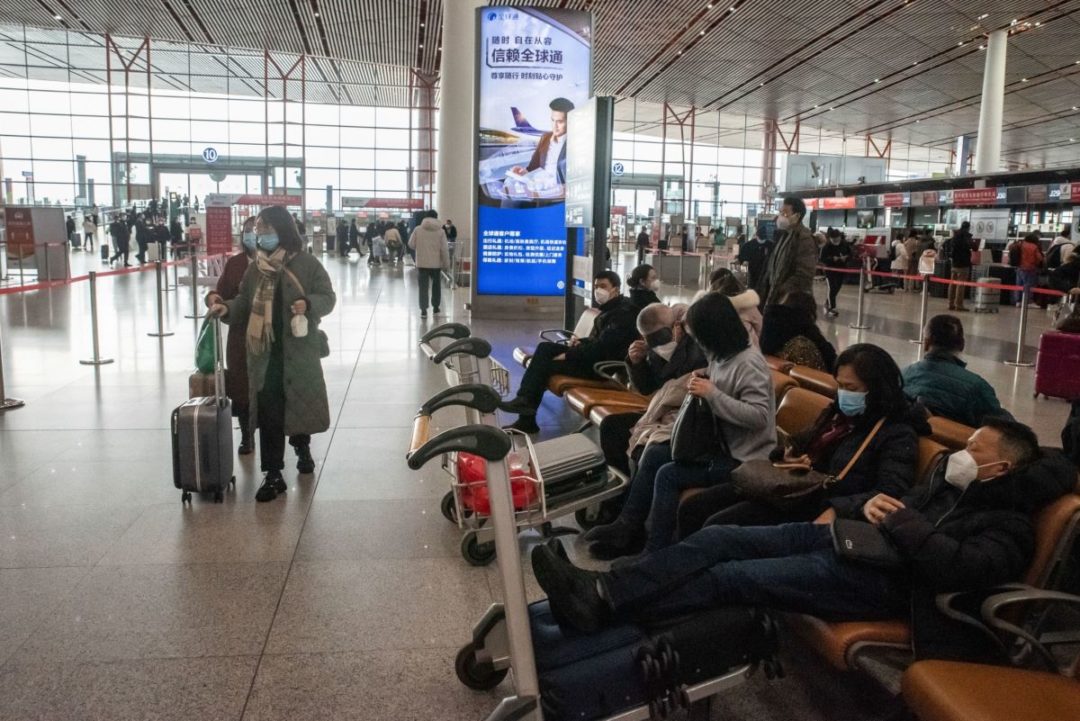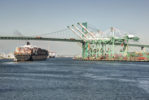
Visit Our Sponsors |
|
|
|
|
|
|
|
|
|
|
|
|
|
|
|
|
|
|
|
|
|
|
|
|
|
|
|
|
|
|
|
|
|
|
|
|
|
|

Travelers at Beijing airport on Jan. 14. Domestic travel is expected to rebound faster than international. Photo: Bloomberg
China’s weeklong Lunar New Year holiday, which kicks off January 22, will be a key test for its aviation sector. As millions of people travel home to be with their families — the first proper reunions since COVID — the question is whether the same chaos seen at airports in other countries as they reopened will be replicated.
Endless queues, a lack of check-in staff and insufficient luggage handlers were common complaints worldwide once virus restrictions were lifted and people took to the skies. While there’s little evidence yet of that happening in China, mayhem could still ensue as big-city office workers — more likely to fly than catch a train — pack their bags.
“As North America and Europe opened up, passengers experienced significant disruptions as a consequence of resource constraints – a shortage of staff at airlines, customs, immigration and security,” said Rob Morris, the global head of consultancy at Ascend by Cirium. “There’s a risk China might see the same if demand rebounds rapidly.”
Certainly the desire to travel is there. Flight bookings are up 15% this Lunar New Year versus last, according to Trip.com, while scheduled inbound flights for the first quarter have increased almost 150% compared with the first quarter of 2022, data from aviation analytics company Cirium show. And with nations from South Korea to Australia imposing restrictions on visitors from China, many expect international travel to rebound more slowly, putting additional strain on domestic networks.
“The willingness to travel has started to rebound strongly among Chinese who have recovered from COVID, but it takes time for that to be reflected in outbound travel routes,” UBS Securities Co.’s head of China leisure and transport research, Chen Xin, said. “Domestic travel destinations are expected to be the biggest beneficiaries during the upcoming Chinese New Year.”
The temporary mass migration comes as Chinese airlines only just start to get their Boeing Co. 737 Max jets back into commercial service after an almost four-year absence. There were some 90 737 Max planes that had been delivered to Chinese airlines and were subsequently grounded in March 2019. A workhorse of consumer aviation, the popular single-aisle plane is useful for two- to three-hour trips, making it ideal for travel within China.
One factor working in China’s favor is that unlike Western carriers, which grounded planes and furloughed staff at the start of the pandemic and then struggled to add capacity when travel came roaring back, airlines in China have largely continued to operate their fleets domestically throughout.
Avolon Holdings Ltd. Chief Executive Officer Andy Cronin said earlier this week that carriers in Asia’s biggest economy should be able to cope well with any rapid demand rebound considering “they’ve got the people, they’ve got the infrastructure ready to go.”
Another element that may shield China’s aviation infrastructure from overload is the expected time it will take for inbound travel to fully recover. While the nation’s large diaspora will doubtless visit as soon as they can, tourists and business travelers are forecast to trickle back at a much slower pace.
What Bloomberg Intelligence says:
Domestic passenger share at Shanghai Airport, China Southern Airlines and peers could fall below 3% during the Lunar New Year travel season this year from almost 4% in 2021-22, based on plans for seat capacity that’s equivalent to 73% of 2019 levels. Railways should attract more passengers versus 2019’s Lunar New Year as travelers find a wider range of seat, fare and route options.
“Executives stuck outside the country for almost three years are keen to get back but they’re also going to be hesitant to put themselves or their teams in harm’s way if there is still any threat of unwarranted hospitalization,” Noah Fraser, managing director of the Canada China Business Council, said.
One pain point that may emerge — a lack of pilots.
Before the pandemic, the country’s burgeoning aviation market offered pilots some of the best-paid jobs in the world, with airlines so desperate for experienced flight crew that they were dangling packages worth more than $300,000-a-year at foreign aviators. However after China shut international travel and imposed sweeping restrictions on movement, compensation packages for foreign pilots flying for Chinese airlines more than halved.
The reopening offers overseas pilots the chance to get back to work on the mainland and while packages aren’t as lucrative as they once were, some airlines are still paying top dollar.
Sichuan Airlines Group Co., for example, is offering $24,441 a month for Airbus SE A330 captains on a three-year deal, and as much as $27,841 a month if they renew the contract, according to a job ad on the website of pilot recruiter Wasinc International Ltd., which specializes in hiring for Chinese airlines.
Chengdu Airlines Co. is willing to pay $25,500 a month for three years for an A320 captain from overseas. The package climbs to $28,600 for a second three-year term, according to Wasinc’s job ad.
“We’re hopeful we can finally get some of our pilots back to China,” Dave Ross, Wasinc’s president, said.
RELATED CONTENT
RELATED VIDEOS
Timely, incisive articles delivered directly to your inbox.






